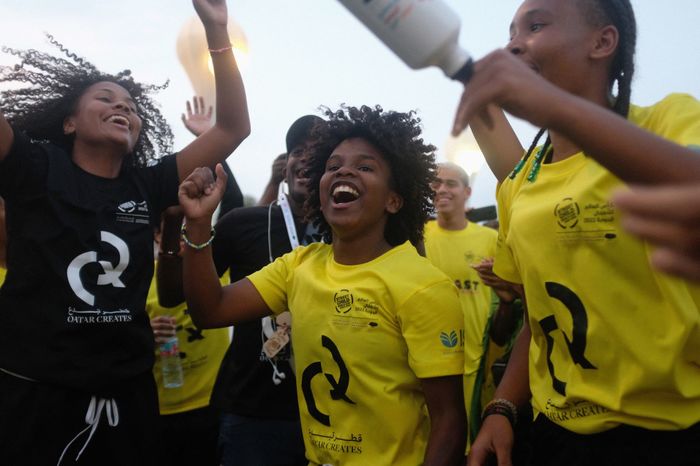Creatura is a distinctly physical film, underpinned by a rare and exhilarating depiction of female sexuality. The very first shot in the film is of a young girl growing curious about the way her body works and discovering physical stimulation for the very first time. It is a moment that occurs for every child everywhere, but one that – particularly as women – we are sworn to secrecy over. The film goes on to show her experiencing sexual attraction for the first time, being sexualised for the first time, and sexualising herself for the first time. It’s a film composed of firsts; firsts that Gimeno directs with an impressive and captivating realness. I sat down with Gimeno to discuss the myriad of complex and deeply personal issues at the heart of this film, and get to the bottom of why it’s garnered so much success at this particular point in time.
Gimeno’s second feature is a striking, visceral tale of one woman’s life, Mila, as she slowly discovers her sexuality and deals with the contradictory forces of love and shame that accompany it. We meet Mila as a child (Mila Borràs), see her experience all of her ‘firsts’ as a teenager (Clàudia Malagelada), and then watch her navigate a long-term adult relationship (when she is played by Elena Martín Gimeno herself). The whole way through, Mila’s complicated relationship with her body and her desires are represented through a persistent rash which occurs when she is stressed and unfulfilled. Repeatedly, she seeks pleasure and intimacy, and repeatedly, she is denied it, ostracised for it, and made to feel ashamed of it. The candour and effectiveness of Gimeno’s film has been rewarded with the Best European Film award at Cannes’ Directors’ Fortnight, and Gimeno told me it “took a few months to understand that it was really happening,” but the success was “really beautiful.”
“Sexual repression is a very important tool to control society, and people who can connect with their desire or sexuality are more powerful, and feel more free”
When I’d finished congratulating her on her win at Cannes, I was desperate to know how Gimeno managed to write, direct, and star in what might be one of the most groundbreaking films of the year. “In my first feature I was acting too, so I don't know how it feels to write and direct without acting,” she said, adding that “in this movie, I feel like stepping in as an actress made me understand the movie in a very physical way. It made me understand the movie better.” After watching the film, I can see precisely why. While there are endless shots of half-naked bodies in the sea or at nightclubs, they never feel formulaic, because they are always being shown to us through Mila’s eyes. Bodies are unique, as is the gaze with which each person looks at them. We watch a woman grow from childhood to adulthood and the whole time we are made to focus on what she feels, and what she sees.
This is a film about what it means to be a woman and to look, and more importantly, to want. Gimeno emphasised that this was her intention, saying that “in the last few years, we’ve talked a lot about sexual violence, and we do need to because it’s a very important topic, but we haven’t talked so much about desire.” She clarified that: “sexual repression is a very important tool to control society, and people who can connect with their desire or sexuality are more powerful, and feel more free. That’s why I’m so interested in talking about this topic.”
“We watch a woman grow from childhood to adulthood and the whole time we are made to focus on what she feels, and what she sees”
The repression of female sexuality and the differing responses to it are expertly and delicately handled by Gimeno. A young Mila describes her own sexual actions as if they were the actions of a friend in conversation with her family, and has to listen to their condemnation and disapproval. When she becomes more open about her sexuality with her parents, her dad tells her: “You make me uncomfortable. It’s not normal to live like that at your age.” Years later, her boyfriend cuts a heated argument about their sex life short by saying exactly the same thing: “I’m uncomfortable.” We begin to see a disturbing process repeat itself: a woman explores her sexuality, the men around her express discomfort, and, ashamed, she represses it.
Gimeno doesn’t just draw attention to the phenomenon of sexual repression, but actively fights against it. Mila avoids the absurd euphemisms for a vagina used by other characters in the film and real life – directly describing her “vulva” in her journey of curiosity about her body. Most strikingly, we see a woman actively and passionately initiate sex with a man, and communicate her desires and fantasies directly. This element of the film prompted me to ask Gimeno what she thought about recent online discourse surrounding sex scenes: how necessary are they, how explicit should they be, and are audiences ready for them? She told me that she’s already “seen a bit of fear in the industry about the sex scenes in Creatura,” which came as no surprise. “People in movies behave very strangely during sex with very studied and clean movements, which don’t represent intimacy or reality”; it’s safe to say that the opposite is true for this film. I asked her whether she thought these depictions came from a place of fear about female sexuality, and she said that “we’ve become too comfortable with sex scenes filmed from the perspective of the male gaze. People even see sex scenes with violence against women and they feel comfortable, then people see a movie that has intimacy and realness and because people feel really reflected, they suddenly feel uncomfortable. That is frightening to me.”
I wanted to close by asking how the film had been received so far, and what effect she wanted it to have on audiences. Gimeno said her favourite reaction to Creatura is “when women or people who aren’t cis-men feel more encouraged to share their inner fantasies and fears and are less judgemental of themselves.” She added that, “something that’s already happening is people telling me that they felt represented by the film, that they felt less alone, and less crazy. That’s what I want to happen,” and it’s no overstatement to say that that is precisely what Creatura did for me.


